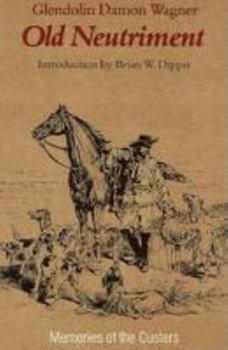Old Neutriment: Memories of the Custers
Select Format
Select Condition 
Book Overview
In 1925 a white-bearded veteran of the Battle of the Little Big Horn was found dead on the porch of his boarding house in Billings, Montana, a smoking gun in one hand and a bag of candy in the other. He was John Burkman, known from Seventh Cavalry days as Old Neutriment, an eccentric recluse whose life had ended, to all intents and purposes, fifty years earlier with the fall of his commander and friend, General George A. Custer. Old Neutriment , so named for his raids on the kitchen at Fort Lincoln, served as Custer's orderly for nine years and probably knew the general better than anyone else, except Libby Custer. In his last years the illiterate old man shared his vivid memories of the Custers with his only friend in Billings, I. D. "Bud" O'Donnell, whose record of his pictur-esque speech enriches Glendolyn Damon Wagner's book. Old Neutriment takes the reader behind the scenes as the devoted orderly fusses with Custer and cares for his dogs and horses. He relates some marvelous stories and recalls the journey of the Seventh Cavalry from Kentucky to Fort Lincoln as well as Miss Libby's tearful farewell to the general and his own forebodings during the march to the Little Big Horn. In the great battle there the orderly was separated from Custer and his troops. Heartbroken by the news of their fate, Old Neutriment could never pick up his life again. "Seems like they want no use me goin' on," he said, many years before he fired his last salute. First published a year after Burkman's death, Old Neutriment now appears in a Bison Book edition with a new introduction by Brian W. Dippie, the author of Custer's Last Stand: The Anatomy of an American Myth (1976) , who considers the intersection of memory and history, of character and fate.
Format:Paperback
Language:English
ISBN:0803297254
ISBN13:9780803297258
Release Date:January 1989
Publisher:University of Nebraska Press
Length:268 Pages
Weight:0.72 lbs.
Dimensions:0.7" x 5.4" x 8.0"
Customer Reviews
1 rating
Moving Memories of Times Past
Published by Thriftbooks.com User , 21 years ago
I like older books like this one, and I have long refused to adopt the contemporary notion that "new" somehow means "good" or "better". I also admit to being a Custerphile and, for most of my years, I have been intrigued by the life and times of this historic personage and, in general, fascinated with the Souix and Cheyenne Indian wars. Along with the virtuoso/composer Franz Liszt, I identify with Custer. Both personages -- brilliant, bold, and brimming with life and energy -- apparently evoked powerful responses in the people they came into contact with. It seems that they were either adored or despised; reactions were rarely lukewarm. This fact speaks volumes -- if you are passively doing nothing that really matters to anyone and are viewed as just another mindless "go along and get along" mediocrity who appears to stand for nothing, you will be categorized as non-threatening and everyone will seem to "like" you. But if you are meaningfully involved in "action", "change", or in "making a difference", you will provoke the envious crowd and rapidly accumulate enemies. Take heart, I say! You can be distinguished and even honored by the level of the opposition -- it's like a sign of success. Just think, Custer eventually had the President of the United States out to get him! John Burkman, like a willing follower in search of a worthy leader, was one of those who had strong, positive reactions to Custer. In fact, he came to idolize Custer, and apparently for good reasons. Burkman, nicknamed "Old Neutriment" because of his late-night kitchen raids at Ft. Lincoln, was Custer's devoted "striker". This book was compiled by Wagner from interview notes taken by I. D. "Bud" O'Donnell, who befriended the reclusive and somewhat eccentric Burkman late in life. Burkman -- gradually coaxed out of his reticence by O'Donnell and family -- romantically and sentimentally remembered the "merry times" (that's what Libby Custer called them) when he spent nine years as orderly in the service of Custer and "Libby", eventually becoming almost like a member of their family. Author Wagner does an admirable job in endeavoring to preserve the old striker's crusty speech. Burkman's life appears to have lost meaning and purpose with the demise of his golden-haired master at the Little Big Horn. Years later, an aged and melancholy Burkman observed that, "Seems like they want no use me goin' on,..." After spending years working himself up to it, Burkman committed suicide in 1925. He was found dead on his boarding house porch in Billings, Montana, a smoking pistol in one hand and a bag of candy in the other. Burkman knew Custer close up, and his memories cast significant light on what Custer was like as a personality. My advice is to read Libby Custer's books along with this one to get the best "feel" for the times, the person, and the circumstances. There is also much of historical value lurking in these pages, in addition to the plain-spoken,





